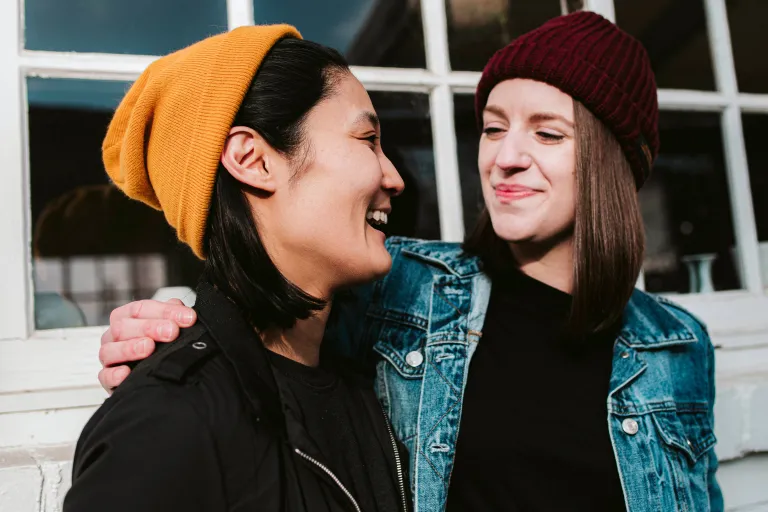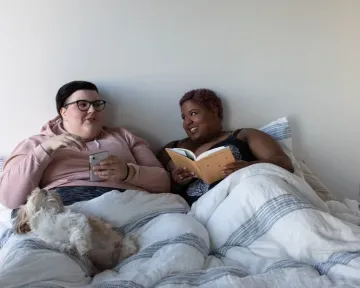
If someone you're friends with or related to comes out, it can bring a whole mix of emotions from excitement and pride to confusion and anxiety. It’s likely both you and your loved one are feeling vulnerable, and you want to be there for them during this potentially empowering and challenging time. As part of Pride month, we explore how to be a supportive ally throughout this journey.
Supporting someone who has come out
When someone is coming out, they can be facing a lot of different emotions ranging from excitement and joy to fear and even shame. A lot of this is often based on societal and cultural stigmas, so try not to blame yourself if someone you’re close to is struggling to open up. It’s a privilege to be trusted with this personal information and there are some steps we can take to be effective ally’s during this time.
It’s important to create a safe and non-judgmental space for our loved ones to talk about their new identity with validation and acceptance. It may take time for them to fully understand who they are and what they want, but being there for them while they figure this out can allow them to freely explore their wants and needs in a healthy way and deepen the trust between you both.
What is an ally?
An ally is someone who actively supports someone in a marginalised group, although they are not from that group themselves. In this case, it would be someone who identifies as straight or cis supporting and advocating for someone in the LGBTQIA+ community, and the community on the whole.
Being an ally is really important because it shows we understand and care about the issues facing our loved ones, even if we don’t face them ourselves. Allies can also help create a more understanding world by challenging people in their own communities to be respectful and caring towards issues that don’t directly affect them.
How can you be a strong ally?
Educate yourself:
Take the time to educate yourself about the LGBTQIA+ community, their experiences, and the challenges they may face. Seek out resources, articles, and books that can help you gain a deeper understanding of the topic.
Use appropriate language:
Using someone’s preferred pronouns and terms can really help to make them feel validated and accepted. If you're unsure what language to use, don’t be afraid to ask them. It shows that you respect their identity and want to support them.
Speak about against discrimination:
Challenging people on discriminatory language, negative stereotypes or mistruths about the LGBTQIA+ community can send a powerful message that you love and care about your friend and their identity. More than this, it can help create a society where they are empowered to freely express themselves and be respected for who they are.
Attend Pride events:
We can show our support by attending LGBTQIA+ Pride events and celebrating the community with them.
What else can I do to support them?
Just like with every relationship, we all want to be listened to, respected and understood. Taking the time to be there for your friend or family member can mean the world of difference at a time they’re likely feeling vulnerable.
Listen with empathy:
Set aside some time when you can be fully present and actively listen to what they have to say. Encourage them to share their thoughts, fears, and hopes without interruption and validate the experiences.
Offer emotional support:
Coming out can be an emotional journey. Reassure your friend or family member that you love and accept them, no matter what. Let them know that you’re there to support them and your door is always open if they need someone to talk to.
Respect their timing and boundaries:
Let them know there is no pressure to do anything before they’re ready. Trust is so important during this process so keep in mind their boundaries when discussing the situation with others and let them find their own rhythm.
Consider speaking to a professional
It’s important to look after yourself too when dealing with change and challenging emotions. If you need support, our counsellors are trained experts in relationships including family, friendships and romantic relationships. Find out which service could be right for you.
How we can help
If you’re looking for support with your relationships, we can help. We offer a range of ways to speak with a trained relationship expert including ongoing counselling, 30 minute web and phone chats, and one session therapy.
Find out which service is right for you
How you can help
Have you found this advice helpful? Make a donation to help us reach more people and continue supporting the nation’s relationships:
Can't afford to donate? We understand. Instead, we ask that you leave us a 5 star review on Trustpilot.

